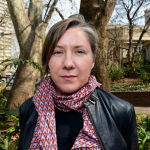Creative Disturbance is proud to announce that Tegan Bristow and Jepchumba, of Future Lab Africa, have been each awarded international student grants to contribute intellectual discussion, obtain exposure for their research and to connect with other researchers around the world.
Tegan and Jepchumba are the leaders of Future Lab Africa, an interactive space that engages cultures of technology through critical aesthetic explorations in Africa.
Future Lab Africa came about as the Post African Futures contribution of Jepchumba, from which the project has evolved as a research collaboration with Tegan. Future Lab Africa hopes to create lasting networks and public engagements which extend beyond the exhibition incorporating research and multi-disciplinary methodologies as a basis of understanding new developments in the African digital art space. This includes the production of a series of podcasts dealing with the following themes:
- Emerging African Disruptive Internet Communities and Digital Spaces.
- Disseminating Identity Politics in Creative Practice.
- The Complexity of Contemporary African Art and Music.
- The Art of Collaboration & Process
The Post African Futures exhibition, a part of Future Lab Africa, was inaugurated as an invitation to Tegan Bristow by the Goodman Gallery to curate an exhibition in extension of ongoing research on art, culture and technology in Africa. Bristow’s research began as a survey of work, focusing on South Africa, Kenya and a small concentration in Nigeria. What Bristow found in this survey was a rich and complex reference to technology that serves a number of critical positions, the most important being a pointed focus on identification and differentiation.
Here, artists are using the conceptual frame of digital technologies and technology languages as a way to talk about African cultures against what they are perceived to be. This is multi-faceted and acts as a critique of both of globalised media practices and romanticised Africanisms. These practices have their foundation in the socio-cultural; global image generation; traditional practices and performance. This frames a critique of globalised forms and a resistance against a cultural predomination.
What Bristow sees in digital aesthetics in Africa is a response; presented as breaking and playing with visual cultures, mixing globalised image norms into local memes and the exploration of globally critical perspective on knowledge. It is important to understand that the practice is definitely not a romantic indigenisation of technology or cute innovations for the irrevocably poor. It is rather a type of border thinking, a live conversation with the world that brings contemporary culture together with socio-cultural knowledge systems.
The title Post African Futures challenges a number of notions. The first being AfroFuturism as a title for any African work that addresses technology or science fiction subject matters. Many African artists have been lumped into this criterion, yet they present articulations that are more unique to their particular regions. The exhibition is an exploration of multiple “African cultures of technology” that have unique socio-political and economic histories.
For instance, technology in South Africa is historically tied to apartheid, a possessive aggressive system of control where communications technology is still a power driven medium. South African artists reflect this — works are visually aggressive and challenge relationships to power, reflecting a lo-fi abrasiveness, an exploration of extremes and failures making for rich visual and aural work. While Kenyan histories are tied to social rebellion and change, here works strongly interrogate social justice, using networks and social narrative as primary conduits.
Post African Futures challenges the notion of “futures and innovation” as failure in bypassing current social and cultural transformation, thus inviting its audience to recognize the socio-cultural and metaphorical use of technology in critiquing histories and simultaneously negotiate the importance of now.
Creative Disturbance Fellows
Tegan Bristow is an interactive media artist and lecturer at the Digital Arts Division of the Wits School of the Arts. Lines of computer code are to her what a golden sunset is to a landscape painter – the stuff of inspiration and the spark of creative potential. Tegan is most interested in the space that digital art affords interaction and engagement, the place where she believes meaning is made.
Apart from being involved in the creation of the first digital art festival in Africa, namely the Fakugesi, she is also working towards her PhD and regularly writes and presents papers at interactive technology forums around the world. Tegan is a self-proclaimed geek at heart, curious about how the world around her works, and believes that creative people should challenge technology and how it is used, every day.
Jepchumba has been listed by Forbes as one of the 20 Youngest Power Women in Africa 2012 and in the Guardian Africa’s Top 25 Women Achievers. A cultural ambassador, Jepchumba is the Founder and Creative Director of African Digital Art, a collective and creative space where digital artists, enthusiasts and professionals can seek inspiration, showcase their artistry and connect with emerging artists. Jepchumba is dedicated to promoting the growth of the creative technology in Africa.
Originally from Kenya, she has lived, travelled and spoken around the world promoting her commitment to creativity, art and technology. An African digital artist she is passionate about creating unique digital experiences. She loves experimenting with motion, sound and various digital effects and techniques and has an extensive background in digital art, web design and development, audio/visual production and user interface and user experience design.
Podcasts with Tegan and Jepchumba:
-
After Fakugesi. The Post-African Futures Labs [ENG] – October 20, 2015
- Together with Tegan Bristow and Jepchumba, two leading figures in the African digital scene and co-founders (with Christo Doherty) of the now iconic Fakugesi festival, we share ideas about emerging trends of digital culture and their ongoing collaboration project with the Post-African Future Africa labs. “Add the power”.
We look forward to the stimulating discussions Tegan and Jepchumba will bring to Creative Disturbance!
If you know talented students that you would like to nominate for a Creative Disturbance fellowship, please reach out to us at feedback@creativedisturbance.org.
 English
English العربية
العربية বাংলা
বাংলা Français
Français Deutsch
Deutsch Bahasa Indonesia
Bahasa Indonesia 日本語
日本語 한국어
한국어 Português
Português Español
Español
